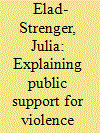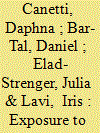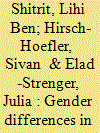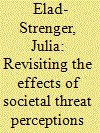|
|
|
Sort Order |
|
|
|
Items / Page
|
|
|
|
|
|
|
| Srl | Item |
| 1 |
ID:
178720


|
|
|
|
|
| Summary/Abstract |
What drives citizens’ support for violence against domestic political actors? Despite its potentially devastating consequences, there is surprisingly little research on the antecedents of this unique form of political violence. Building upon recent insights on the psychological implications of exposure to conflict on support for political violence, we examined the motivations underlying public support for violence against politicians in the context of protracted conflict. Using a two-wave panel design among Jewish-Israelis, we examined the interactive effects of conflict-induced perceived threat, psychological distress, and political orientation on support for violence against politicians. Consistent with previous findings on the psychological implications of conflict, our findings suggest that conflict-induced threat perceptions play an important role in predicting support for violence against politicians. Nevertheless, our findings point to important boundary conditions to these effects: the strength of the relationship between perceived threat and attitudes towards political violence is qualified by the level of chronic conflict-related psychological distress, and the direction of the effects of perceived threat is qualified by individuals’ self-placement on the left-right continuum. More specifically, we found that perceived threat increased rightists’ support and decreases leftists’ support for violence against politicians, only under high, but not low, conflict-related psychological distress. The main conclusion of this study is that support for violence against politicians can be seen as an ideology-driven protective strategy against the negative psychological implications of exposure to violent conflict. By pointing to the importance of understanding the interactive role of psychological and political factors in determining public support for such acts, our findings therefore contribute to the understanding of a relatively understudied phenomenon with potentially catastrophic effects on political stability.
|
|
|
|
|
|
|
|
|
|
|
|
|
|
|
|
| 2 |
ID:
150992


|
|
|
|
|
| Summary/Abstract |
Does ongoing exposure to political violence prompt subject groups to support or oppose compromise in situations of intractable conflict? If so, what is the mechanism underlying these processes? Political scholarship neither offers conclusive arguments nor sufficiently addresses individual-level forms of exposure to violence in the context of political conflict, particularly the factors mediating political outcomes. We address this by looking at the impact of exposure to political violence, psychological distress, perceived threat, and ethos of conflict on support for political compromise. A mediated model is hypothesized whereby exposure to political violence provokes support for the ethos of conflict and hinders support for compromise through perceived psychological distress and perceived national threat. We examined representative samples of two parties to the same conflict: Israelis (N = 781) and Palestinians from Gaza, East Jerusalem, and the West Bank (N = 1,196). The study’s main conclusion is that ethos of conflict serves as a mediating variable in the relationship between exposure to violence and attitudes toward peaceful settlement of the conflict.
|
|
|
|
|
|
|
|
|
|
|
|
|
|
|
|
| 3 |
ID:
156655


|
|
|
|
|
| Summary/Abstract |
The relationship between gender and political aggression is hotly debated and the empirical evidence is often mixed. While many surveys find a gender gap, with women less supportive of politically motivated aggression and violence than men, numerous case studies point to women’s active involvement in political violence and refute the association of women with peacefulness. This article argues that the gender–aggression relation depends upon (1) the type of political aggression under study (i.e. direct vs. indirect political aggression), and (2) contextual factors, notably the salience of a protracted conflict. Using original datasets representing Israeli Jews (N = 3,126) we found that in the context of protracted conflict, gender has a unique effect on support for indirect forms of political aggression, over and above other central predictors of political aggression (i.e. political orientation and threat perceptions), such that women are actually more supportive of politically motivated social distancing and exclusion of out-groups in conflict as compared to men. Women and men, however, do not differ in their support for direct, politically motivated, violent acts against government officials. Results also shed light on potential mechanisms underlying these differences (and lack thereof), in the context of protracted conflict. The findings cast further doubt on the stereotype of ‘peaceful women’ and point to the need for policymakers concerned with conflict resolution to address context-related factors when considering the gender-based differences in political aggression.
|
|
|
|
|
|
|
|
|
|
|
|
|
|
|
|
| 4 |
ID:
161598


|
|
|
|
|
| Summary/Abstract |
Past research has produced convincing evidence for the association between perceived societal threat and political conservatism. Based on the view of political worldviews and threat perceptions as multifaceted constructs, the present study suggests that certain types of perceived threat are actually associated with the endorsement of more politically liberal positions. Employing a three-wave naturalistic design, we examined the unique longitudinal effects of perceived threats from real-life political events that challenge either liberal or conservative values, on conflict-related attitudes, using a nationally representative sample of Jewish-Israelis (N = 437). Consistent with our hypotheses, perceived threat from events that challenge conservative values was associated with increased militaristic attitudes and decreased willingness to compromise for peace over time, whereas perceived threat from events that challenge liberal values was related to decreased militaristic attitudes and increased willingness to compromise for peace over time. Theoretical and practical implications of these longitudinal effects are discussed.
|
|
|
|
|
|
|
|
|
|
|
|
|
|
|
|
|
|
|
|
|